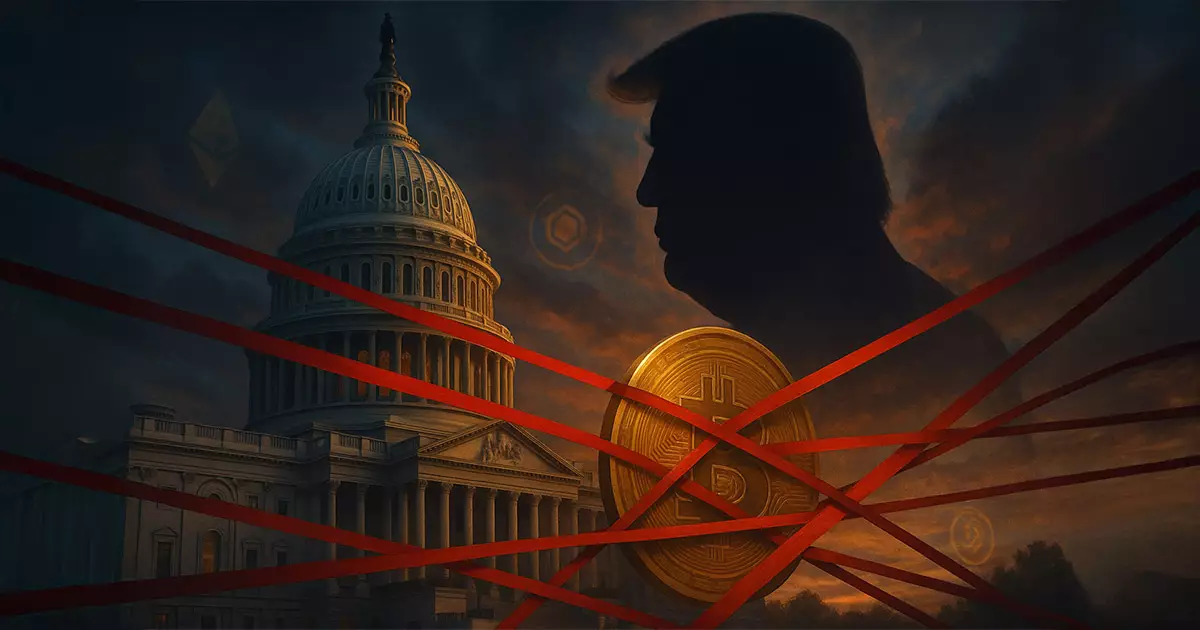In recent discussions surrounding U.S. President Donald Trump’s ventures into cryptocurrency, a critical and jarring reality has emerged: personal gain appears to overshadow significant legislative progress. This intertwining of private interests and public policy raises fundamental questions about integrity and governance. The latest discussions have gained traction, indicating a troubling trend where political leaders exploit market opportunities while sidelining citizens’ interests. Trump’s entrenchment in the crypto space poses profound ethical dilemmas that cannot be overlooked.
Ryan Gilbert, founder of fintech venture capital fund Launchpad Capital, echoed this sentiment when he expressed disappointment that “personal business is getting in the way of good policy.” Unfortunately, this unfortunate reality highlights the stark contrast between the potential benefits of policymaking intended to foster growth and innovation, and the corrosive influence of self-serving actions by prominent figures. As legislators attempt to craft a regulatory framework around stablecoins—efforts encapsulated in the Guiding and Establishing National Innovation for U.S. Stablecoins (GENIUS) Act—it becomes evident that the path forward is fraught with obstacles, many of which are self-imposed by the presidency itself.
The GENIUS Act: A Step Toward Responsible Regulation?
The GENIUS Act was designed as a vehicle to establish a much-needed regulatory landscape for U.S. payment stablecoins, yet it has encountered pushback amid concerns about Trump’s financial involvement in the cryptocurrency market. Despite the optimistic assertions from industry insiders like Katrina Paglia, who anticipated smooth sailing for the bill, the realities of American politics have hampered progress. The recent Senate vote, which failed by just one vote at 48-49, signals that the concerns surrounding Trump’s crypto business interests are significantly impacting effective legislation.
Ethics and legislation should not be mutually exclusive, yet voters are subjected to an ever-growing list of conflicts every day. The ripple effects of Trump’s various crypto ventures reveal a scenario where political power has been leveraged for financial windfall. The swift rise and subsequent fall of his $TRUMP memecoin exemplifies the volatility and risks inherent in crypto investing, while simultaneously reflecting the glaring discrepancies in accountability among America’s political elite. The drain on small investors—exceeding $2 billion after the token’s peak—illustrates a broader societal issue: political engagement seems to benefit the privileged few while jeopardizing the average American’s economic well-being.
Unraveling Trump’s Influence
Trump’s financial entanglements extend beyond his own ventures, as evidenced by his family’s reported involvement with Binance, a leading cryptocurrency exchange facing substantial legal hurdles. Reports have surfaced regarding the Trump family negotiating a stake in Binance, a firm which pleaded guilty to violating anti-money laundering regulations. This only deepens the ethical quandary surrounding the integrity of democratic institutions and the critical balance of power.
Moreover, revelations indicate that Trump’s memecoin endeavors have reportedly lined his pockets with an astounding $350 million, money that has not been used to foster national improvement but rather to enrich individuals amid a crisis. Congresswoman Maxine Waters succinctly summed up the prevailing sentiment: “Trump ran on a campaign to put more money in the pockets of Americans—turns out he just meant his pockets and those of his cronies.” The implication here is clear: Trump’s crypto ventures have transformed political leadership into a for-profit enterprise, a glaring departure from the principles of public service.
The Broader Implications for Crypto Legislation
Scrutiny has intensified around Trump’s crypto dealings to the point where congressional deliberations have become a battleground for ethical standards and legislative integrity. With upcoming proposals like the End Crypto Corruption Act aiming to stave off future conflicts of interest, the urgency for regulatory clarity has never been higher. Senator Mark Kelly’s remarks highlight a growing bipartisan acknowledgement that prevalent practices may threaten the very integrity of democratic processes—where financial influences can sway legislative outcomes.
As debate heats up, it should be apparent that allowing political leaders to profit from personal business interests linked to regulated markets cannot persist without dire consequences. The ongoing negotiations surrounding the GENIUS Act, though hopeful for legislative clarity, remain clouded by the controversies surrounding Trump’s financial empire. The potential for the passage of this law, while necessary for the future of crypto regulation, is overshadowed by the ever-present specter of corruption linked to its most prominent advocate.
Ultimately, the convergence of politics and personal gain within the cryptocurrency space must serve as a warning for legislative bodies. Going forward, the challenge will be not merely to craft sound policies but also to uphold the integrity of governance in a system where money and influence are inextricably linked. This is not just about legislation; it is about ensuring that American principles remain intact in the evolving financial landscape.



















